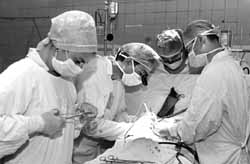Physicians try to adopt code of ethics

The first National Bioethics Congress ended on September 20. It was held under the slogan, Science W ithout Conscience Drains the Soul. Indeed, in light of the latest medical and biological developments, the issue of bioethics takes on added relevance with each passing day. Experiments with cloning, the Human Genome Project, disseminating genetically modified organisms and transplants have made the line between murder and deliverance from physical suffering far too oblique. Many scientists believe that there are a host of technologies likely to cause a “self-denial of life.”
In the West, problems of bioethics [biological ethics] are among the top priorities of national politics. Parliaments in many countries have banned cloning experiments and no one considers the news sensational, at least now. Bills are passed, prohibiting the proliferation of genetically modified organisms. In Europe, apart from national research ethics committees, are also local committees with lawyers working alongside physicians to closely monitor all high technologies lest they infringe on man’s prime right to live and retain his dignity. The importance of the legal aspect is evidenced by the fact that the Council of Europe adopted the Convention on the Protection of Man’s Rights and Dignity in View of Applying Biological and Medical Achievements. Ukraine seems in no hurry to ratify it, and our bioethics committees are in the neonatal phase as is our legislation dealing with the noosphere. The law on organ transplants, enacted not so long ago (and the hard way, it turned out) is outwardly not at all bad. Yet the recent experience of Lviv physicians shows that it cannot serve as an effective obstacle to enrichment at the expense of human lives. When opening the congress, the scientists agreed that the level of bioethics is the level of a given country’s evolution, and that this problem must be a nation’s priority. Still, one is left wondering. For objective reasons, Ukraine has not come so close to human cloning and gene manipulation as to raise the matter to the priority level, although it is necessary, of course, to determine the criteria of what benefits and damages man. Dr. Lubomyr Pyrih, academician of the Academy of Medical Science and corresponding member of the National Academy of Sciences, believes that man should remain the way he was made by evolution, and this is the main criterion. “Man in his evolution lags behind scientific progress; he cannot keep pace as a biological creature, and this increases the number of suicides and mental disorders,” says Prof. Pyrih.
Yet a code of medical ethics remains the most painful issue; it is nonexistent in Ukraine. The bill read at the September 18 meeting contained terminology totally unfamiliar to the Ukrainian physicians (like autonomization, meaning the patient’s and physician’s independence). Its key idea is the patient’s being completely informed about his condition, possible consequences, and the kind of medications he is being administered. At the same time, it is understandable that, if enacted, this covenant will rule out placebo treatment, and the latter is quite actively applied in the West. It is likewise not understandable how the new medical drugs will be proven. Under the draft code, the patient’s relatives must be informed about his condition. In other words, gone will be the times when the doctor would talk about the diagnosis in a roundabout way “for the patient’s sake.” True, it is too early to talk about changes, because the congress was able only to approve the code, not enact it. It is hard to say when it will become an official document. Another thing is what effect it will have on the Ukrainian Health Service, still an open question. Until now the legal aspect of medicine has existed only formally and our society is not accustomed to giving such questions the status of priority, believing it best to settle such matters, to put it mildly, privately.






